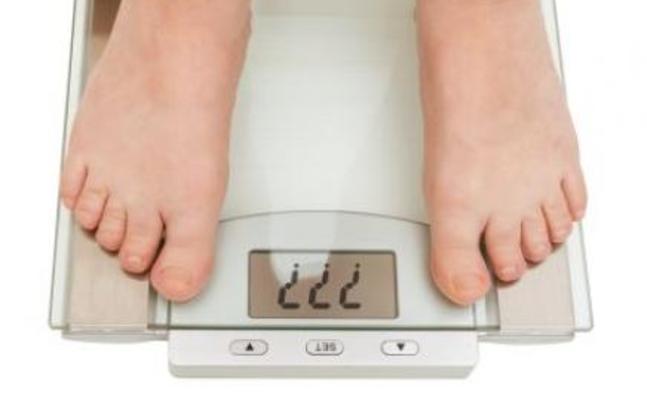How to Talk to Your Kids About Their Weight
A rule of thumb that's not always obvious to people: Never criticize someone’s weight. It can really do damage to their self-esteem, even if your *intention* was to be helpful and encourage them to be healthier. And that’s especially true when it comes to your own child. An off-the-cuff comment could have lasting mental and physical effects, according to new research published in the journal Eating and Weight Disorders.
For the study, Cornell University researchers surveyed 501 women between the ages of 20 and 35. They asked about eating habits, weight satisfaction, current BMIs, and if they recall their parents talking about their weight growing up. Women who presently felt unsatisfied with their weight were more likely to report that their parents commented on their weight when they were young. And, if Mom or Dad’s plan was to encourage weight loss, it seemed to backfire. Researchers found the more a parent commented on weight, the higher the BMI of the adult daughter.
RELATED: We Could All Learn a Thing or Two About BMI from This Eigth-Grader
So is it ever OK to talk to your child about their weight? Sure, but it's important to follow these dos and don’ts when approaching the topic with him or her.
Do: Validate Your Concerns with a Doctor
“It’s perfectly normal to be concerned about a child’s health,” says Renee Engeln, Ph.D., a psychologist and body image researcher at Northwestern University. “But it’s far too easy today to confuse weight and health.” Think of the term “skinny fat.” Just because someone is thin doesn’t mean they’re healthy—and vice versa. So before you broach the subject with your son or daughter, make sure a physician would also agree with your concerns about his or her health, says Engeln.
Don’t: Assume the Conversation Will Push Your Child to Get Healthy
As the Cornell University researchers showed, the more parents commented on weight, the higher the BMIs of their grown-up daughters. “I can’t say this enough: Body shame is not a diet plan,” says Engeln. “Please do not shame your children in the hopes that it will help them lose weight.” If your child feels ridiculed, they may actually be less likely to adopt healthy behaviors. “The more you feel judged because of your weight, the less interested you tend to be in healthy eating, the more likely you are to binge, and the less likely you are to exercise,” says Engeln. Plus, chances are they’ll remember what you say to them well into adulthood. “I can’t count how many grown women I’ve talked to who still bear the psychological scars of those types of parent behaviors,” she says.
RELATED: 4 Women Share the Real Struggle of Overcoming Their Mothers' Negative Body Image
Do: Discuss Body Functionality Instead of Body Weight
“Instead of talking about weight with your children, talk about body functionality and how to take good care of a body by giving it what it needs,” suggests Engeln. Start by pointing out all of the amazing things your child’s body can do at this very moment—run to the park, swing on the monkey bars, score a goal on the soccer field. Then, ask them what they’d like their bodies to do in the future. “Teach them about all the magnificent, unseen functions of their bodies and how nutrient-rich foods help those processes,” says Engeln. They’ll be more likely to fill their plates with broccoli if they know it’ll help them run across the field faster during soccer tryouts.
Do: Lead by Example
The same goes for your own exercise and nutrition habits, as well as any under-the-breath comments you make about your own body. “Don’t talk about dieting or the parts of your body you don’t like,” says Engeln. Instead, let your child overhear positive comments, like, “My arms look SO strong!” Or avoid talking about weight altogether and encourage your child to get moving by doing activities together, like nighttime walks or mother-daughter yoga sessions. Just be sure to make it more about having fun than about calorie burning, says Engeln.
RELATED: 6 Ways to Boost Your Body Confidence
Don’t: Connect Self-Worth with Body Weight
Your child is already overloaded with unrealistic body ideals and shaming (thanks, social media). And research shows parents who comment on body weight pass their stereotyping of overweight people onto their kids, says Engeln. To stop the cycle, think twice before saying anything at all. “Focusing on weight, especially for young girls, reinforces the idea that bodies are for being looked at and evaluated,” says Engeln. “No little girl needs to hear it from her parents. The last thing you want to do is give your child any reason to think that his or her self-worth—or the worth of others—should be based on body weight.”
-
Healthy salad for weight loss
-
How to Lose Weight WITHOUT Skipping Meals
Well this contradicts everything weve been told: Eating just two big m
-
7 Nutrients (Besides Fiber and Protein!) That Can Help You Lose Weight
Even if your diet is a fruit-and veggie-packed rainbow of healthiness,
-
Cut calories with a healthier lasagne
-
Battling Mid
Many readers are struggling with the same issues, and I frequently get
-
Kill the sweet cravings
- DON'T MISS
- How to make smart weight loss goals
- Q&A: Which Is Better to Skip at Dinner Out: The Bread Basket or Dessert?
- Do you bake your own bread?
- Inspirational Weight Loss Video
- Lose weight - by changing your shopping list
- Why broccoli is so good for you
- The Secret Ingredient That Can Help You Lose Weight
- Can eating yoghurt make you gain weight?
- Best Weight Loss Clinics In Hyderabad – Our Top 10 Picks
- 7 Tips for Looking Abs-tastic In Your Halloween Costume




